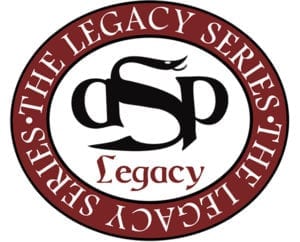The Legacy Series: What it Is, Why it Matters

Europeans have always known that writers who practice one form of writing might naturally write in another form. American publishers seem stymied when poets write novels or playwrights turn to prose. Fortunately, Alan Squire Publishing gets it! Now, what was so hard about that? Grace Cavalieri
Anyone who has founded, worked for, or been published by an independent literary press knows the joys of it: Being able to put great writing into print without going through tiers of vetting by the “marketing” department; editors and authors working one-on-one to polish the work to a deep shine; finding the best look and feel for each book; and the over-arching feeling that each volume of poetry or prose produced is not simply good but deeply precious, and deserving of the best possible audience. All labors of love, indeed.
But we also know the pitfalls of shoestring budgets and limited staffing, and the resulting burnout that can assail even the most dedicated of indie publishers. This is why so many good indie presses fold after a few years, or are bought out by larger publishers. Longevity in indie publishing is a hard-won goal. And many good works of poetry and prose disappear when the press that put them into print goes out of business.
When we founded ASP in 2010, we were both optimistic and practical. Our first titles sold well, and we were careful not to take on too big a list or try to grow too fast. But we were and are also ambitious —and one of our ambitions was to revive the tradition of the “readers” popular in academia in the mid-20th century, which allowed readers to trace the arc of a significant writer’s literary development in a single, representative volume. These volumes often contain a mix of genres — poetry, essays, short stories, plays, even lectures and letters — something that big publishers in the U.S. have increasingly shied away from. This ambition, coupled with our admiration for and pride in the history and lineage of small presses, led to the creation of our Legacy Series, which kicked off with The Richard Peabody Reader in 2015.
Richard exemplifies the three criteria that the series is governed by. First, the majority of his fiction and poetry has been published by independent presses; second, he is active and accomplished across several genres of writing; and third, he is a consistent and influential champion of the work of other writers, through his own Paycock Press and his much-lauded Gargoyle Magazine, as well has his teaching, mentoring, and advising. In The Richard Peabody Reader, we were able to bring back into print work that had appeared in now defunct indie presses, as well as to establish, in one volume, the depth, breadth, and power of Richard’s poetry and prose. We hired the late, brilliant Lucinda Ebersole to edit the volume, and Pulitzer-Prize winner Michael Dirda to write the introduction.
When we launched the book to a packed house at that year’s AWP conference, ASP co-founder James J. Patterson asked everyone in the room whose career had been assisted in some way by Richard to raise their hand. In a room of perhaps 200 writers, every single person raised a hand. Richard is hero to us at ASP, and one of the inspirations for our founding; we were thrilled to able to pay back a bit our debt to him in this way.
Two years later, we followed up with Other Voices, Other Lives: A Grace Cavalieri Collection, a selection of that writer’s poetry, plays, and interviews. Grace is both a wildly, outrageously gifted poet and dramatist and a great mentor to other writers, through her legendary weekly interview series “The Poet and the Poem,” now burning brightly toward its 50th year, as well as her own independent press, The Bunny & the Crocodile, and her enthusiastic mentoring of other writers. As with Richard’s book, we were able to put back into print poems of Grace’s that had disappeared with their publishers, and to establish the beauty and variety of Grace’s poems and plays. As with Richard, we offered to hire the editor and introduction writer of Grace’s choosing. It was one of the greatest honors of my life that this powerhouse of literary greatness and personal generosity chose me for those roles, and she and I spent many happy hours combing through poems and plays and interviews, talking influences and arcs of development, and sipping prosecco.
In October 2019, we’ll publish our third Legacy Series Volume, Navigating the Divide: Selected Poetry & Prose by Linda Watanabe McFerrin. Linda is a poet, fiction writer, and essayist, as well as the founder of San Francisco’s long-running literary organization, Left Coast Writers. With her friend and collaborator, ASP flagship novelist Joanna Biggar, Linda runs a series of traveling writers’ workshops, and publishes the Wanderland Writers Anthology Series. Traveling on the west coast, we heard countless stories from grateful writers who said they would never have made it into print without Linda’s teaching, mentoring, and encouragement, and realized that that, combined with her devotion to indie presses, made her an ideal candidate for the series. Joanna Biggar is editing and writing the introduction to this volume. Given her knowledge of Linda’s work and aesthetic, as well as Joanna’s own precise and brilliant prose, this should be a very special book, indeed.
As long as there are writers like Richard Peabody, Grace Cavalieri, and Linda Watanabe McFerrin in the world — writers who not only produce brilliant work of their own, but who are equally committed to the care and support of other writers, and who have contributed substantially to the indie press tradition — we will continue to find and celebrate them in these volumes. It is an honor to work with them at ASP.
—Rose Solari, Co-Founder